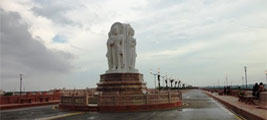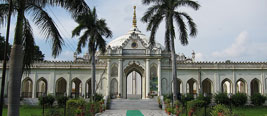About Lucknow
Lucknow ( Hindi: लखनऊ, Urdu: لکھنؤ, Lakhnau ) is the capital city of Uttar Pradesh, the most
populous state of India. Lucknow is also the administrative headquarters of Lucknow District and
Lucknow Division.
Located in what was historically known as the Awadh region, Lucknow has always been a
multicultural city. Courtly manners, beautiful gardens, poetry, music, and fine cuisine patronized
by the Persian-loving Shia Nawabs of the city are well known amongst Indians and students of South
Asian culture and history. Lucknow is popularly known as the The City of Nawabs. It is also known
as the Golden City of the East, Shiraz-i-Hind and The Constantinople of India.
Today, Lucknow is a vibrant city that is witnessing an economic boom and is among the top ten
fastest growing non-major-metropolitan cities of India. It is the second largest city in Uttar
Pradesh state. The unique combination of its cultured grace and newly acquired pace is its most
promising feature that augurs well for the future.
Presently Lucknow has been developed in a grand way by the Uttar Pradesh Government. Though
Lord Buddha never came to lucknow . Till now Lucknow was used as a transit to Buddhist Circuit but
now it showcase the modern sculpture of the lord , visit huge stupa and grand idols of Lord
Buddha and see the grandeur of lucknow city also visit Bada Iambada and ChotaIimambada , Bhool
Bullaiya. Do shoping of chickenkari clothes and dresses which is very light waited and
comfortable. People come from all around the world to buy it. It is also very famous for its
Zardogi work. This cosmopolitan city is popular for it’s famous and delicious non-vegetarian
food. So you will see not only the traditional culture in Old Lucknow areas but also the
culture of new era in New Lucknow area.
Being the capital city of Uttar Pradesh it is well connected by road, rail and air to all
cities. It has also an airport which connect Lucknow to the other famous tourist destination.
| HIGHLIGHTS OF THE CITY |
| |
| Bauddha Vihar Shanti Upvan |
5 km away from Charbagh Railway Station on the V.I.P. Road, the  Bauddha Vihar Shanti Upvan is
another new attraction of the city. The site, spread over an area of about 32.5 acres,
presents a rare picture of architecture and symmetry, its magnificent building are built in
sand-stone with tall pillars. The Meditation Hall, Library, International Buaddha
Shodh Sansthan, four-faceted sculptures Bhikshu Niwas, Restaurant Parking and the
lush green gardens are some of the major attractions here. Bauddha Vihar Shanti Upvan is
another new attraction of the city. The site, spread over an area of about 32.5 acres,
presents a rare picture of architecture and symmetry, its magnificent building are built in
sand-stone with tall pillars. The Meditation Hall, Library, International Buaddha
Shodh Sansthan, four-faceted sculptures Bhikshu Niwas, Restaurant Parking and the
lush green gardens are some of the major attractions here. |
| |
Lucknow 1 Day Tour
|
| |
| Dr. Bhimrao Ambedkar Gomti Buddha Vihar |
Adjacent to Dr. Bhimrao Ambedkar Samajik Parivartan Sthal,
 a 30 meter – wide and about 700 meter long stretch of Gomti river front
has been developed as Dr. Bhimrao Ambedkar Gomti Buddha vihar on an area of 7.5 acres. The 18
feet high four-faced marble statue of Tathagat Gautam Buddha installed here is worth seeing.
The embankments on both banks of the river Gomti have been beautified and well illuminated
promenades with street furniture have also been constructed. a 30 meter – wide and about 700 meter long stretch of Gomti river front
has been developed as Dr. Bhimrao Ambedkar Gomti Buddha vihar on an area of 7.5 acres. The 18
feet high four-faced marble statue of Tathagat Gautam Buddha installed here is worth seeing.
The embankments on both banks of the river Gomti have been beautified and well illuminated
promenades with street furniture have also been constructed.
|
Rumi Darwaza
The 60 feet high Rumi Gate was constructed under Nawab  Asafl-us-Daula in 1786. It is said to be identical in design to an ancient
portal at Constantinople. Its uppermost part consists of an eight faceted chhatri, approachable by a
staircase. Asafl-us-Daula in 1786. It is said to be identical in design to an ancient
portal at Constantinople. Its uppermost part consists of an eight faceted chhatri, approachable by a
staircase.
Asafi Imambara (Bara Imambara)
Also known as the Bara Imambara, it was built by Nawab  Asaf-ud-Daula in 1784 and is one of the architectural wonders of that era. Its
central hall is said to be the largest vaulted chamber in the world. Except for the galleries in the
interior, there is no woodwork in the entire structure. It has large underground passages which have
been blocked up. A staircase from outside leads to a series of labyrinths known as Bhool-Bhulaiyan
which is a complicated entanglement of zig-zag pass. Visitors are advised to visit only with
authorized guides. Within the compound of the Imambara is the grand Asafi Mosque. Shahi Baoli is
another attraction here. Asaf-ud-Daula in 1784 and is one of the architectural wonders of that era. Its
central hall is said to be the largest vaulted chamber in the world. Except for the galleries in the
interior, there is no woodwork in the entire structure. It has large underground passages which have
been blocked up. A staircase from outside leads to a series of labyrinths known as Bhool-Bhulaiyan
which is a complicated entanglement of zig-zag pass. Visitors are advised to visit only with
authorized guides. Within the compound of the Imambara is the grand Asafi Mosque. Shahi Baoli is
another attraction here.
Timing : Sunrise to Sunset
Entry fee : Rs. 25.00 (Indian)
Rs. 300.00 (Foreigner) (inclusive of Bara Imambara, Chhota Imambara, Picture
Gallery, Shahi Hamam)
Chhota Imambara
Though Popularly called as the Chhota Imambara, the  Hussainabad Imambara stands to the west of Bara Imambara. Built by Nawab
Mohammad Ali Shah (1837-42), it is more ornate in design with exquisite chandeliers, gilt-edged
mirrors, silver mimbar and colourful stuccos which adorn the interiors. A golden dome and fine
calligraphy on the exterior of the building makes it a truly exceptional monument of Mughal
architecture (open : 0600 hrs to 1700 hrs.). Hussainabad Imambara stands to the west of Bara Imambara. Built by Nawab
Mohammad Ali Shah (1837-42), it is more ornate in design with exquisite chandeliers, gilt-edged
mirrors, silver mimbar and colourful stuccos which adorn the interiors. A golden dome and fine
calligraphy on the exterior of the building makes it a truly exceptional monument of Mughal
architecture (open : 0600 hrs to 1700 hrs.).
Jama Masjid
The construction of Jama Masjid, to the north-west of  Hussainabad Imambara, was started in 1832 AD during the reign of Mohammad Ali
Shah but was completed after his death by his begum, Nawab Malika Janah. It is entirely free from
the pseudo-Italian art then in vogue in Lucknow and reflects the Mughal style of
architecture. Hussainabad Imambara, was started in 1832 AD during the reign of Mohammad Ali
Shah but was completed after his death by his begum, Nawab Malika Janah. It is entirely free from
the pseudo-Italian art then in vogue in Lucknow and reflects the Mughal style of
architecture.
Shahnajaf Imambara
This white domed mausoleum owes its existence to  Ghazi-ud-din Haider, who on the bank of the Gomti near Sikanderbagh reproduced a
copy of Hazrat Ali's burial at Najaf in Iraq. Ghazi-ud-din Haider, and later his three wives, were
buried here. The silver tomb of Ghazi-ud-din Haider lies in the centre of this building and is
flanked by the more imposing silver and gold tomb of Mubarak Mahal on one side. Ghazi-ud-din Haider, who on the bank of the Gomti near Sikanderbagh reproduced a
copy of Hazrat Ali's burial at Najaf in Iraq. Ghazi-ud-din Haider, and later his three wives, were
buried here. The silver tomb of Ghazi-ud-din Haider lies in the centre of this building and is
flanked by the more imposing silver and gold tomb of Mubarak Mahal on one side.
|
|
|